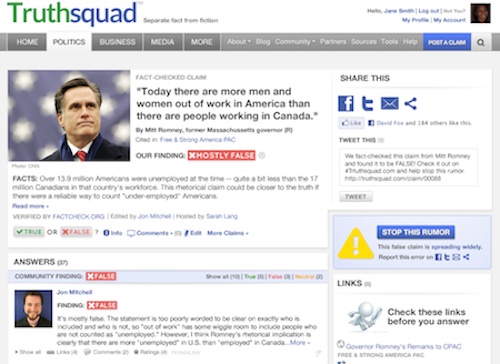
What’s new is additional financial backing from Craig Newmark and a partnership with the Center for Public Integrity — and with them Truthsquad plans to go big, creating widgets and tools for fact-checking statements on any news site and joining PolitiFact and FactCheck.org as part of the Internet’s informal truth-sleuth network.
The big push is a new phase for NewsTrust, which plans to shift its focus from its news curation and media literacy work to focus on fact-checking and building out Truthsquad with a launch this fall. When I spoke to Fabrice Florin, executive director of NewsTrust, he said the current state of politics and media have made for a environment ripe for fact-checking.
“Truthsquad shows a lot of promise because it directly addresses a need,” said Florin. “There is a growing amount of misinformation, particularly in this political climate. We have an opportunity to provide a useful service by encouraging a collaboration between journalists and citizens.”
“We don’t expect citizens to be better than journalists.”
Truthsquad will be working on two fronts, on its website and on embeddable widgets for stories on any news site. In both cases readers could either suggest or assess statements for their truth (or truthiness), which would require supporting facts and links to make a determination. Through the partnership with the Center for Public Integrity, Truthsquad will have a handful of journalists providing fact checks as well as a community manager to give readers guidance on how to verify information and identify reliable sources.
“We don’t expect citizens to be better than journalists — we know an experienced journalist can get more work done,” he said. “But just getting citizens to participate in it will help them develop more of an open mind, build their research skills and appreciate the value of looking at different perspectives.”
Here’s one example, a dispute over the veracity of a Glenn Beck quote about how the government calculates inflation. Among Truthsquad readers, 41 say the statement is true; 112 say it’s false; 16 aren’t sure. Each have their opportunity to present evidence, but in the end Truthsquad editors (represented in this case by MediaBugs boss Scott Rosenberg) come in to render a final verdict. (In this case, “mostly false.”)
One key to getting people involved in the project will be using game-like mechanics in the truth vetting process with things like quizzes, points, or badges, Florin said. In their pilot project, they discovered that traffic and engagement on the Truthsquad project was 10 times higher than to the main NewsTrust site. “From our experience at NewsTrust, it’s no longer enough to get people informed, you have to get them engaged,” he said.
Another way to get people involved in fact-checking is by connecting with news that matters to them, particularly local or community news. Florin points to the growth of fact-checking at local and regional news sites, places like Voice of San Diego and Honolulu Civil Beat among others. He said they want to help those organizations augment what they do and drive more eyeballs to their work.
Fact-checking is something of a growth market, as PolitiFact (a Pulitzer winner, thank you) and Factcheck.org have shown, because of what they propose: well-packaged conclusive answers. Unlike a typical news item, you’ll (hopefully) have a concrete idea whether what you’ve been told is true or false.
Florin said the growth in fact-checking is a response not just to public officials getting bendy with the truth, but also how people consume information now. With an expanding universe of news options, once someone find a source of information they like or agree with, they tend to cling to it, Florin said. The reason Truthsquad is partnering with FactCheck.org and PolitiFact is to get people thinking about what they read and hear, and from there, questioning it.
“In the fact-checking space we have an opportunity to add value, galvanize and promote the few organizations that are doing this,” he said. “We’re trying to grow the fact-checking movement, we want to be the glue that holds these organizations together.”